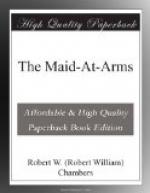But Dorothy shook her head, saying that she meant to ride the boundary with us; and the children, after vainly soliciting my company, trooped off towards that same grist-mill in the ravine below the bridge which I had observed on my first arrival at Varick Manor.
“I am wondering,” said Dorothy, “how you mean to pass the morning. You had best steer wide of Sir Lupus until he has breakfasted.”
“I’ve a mind to sleep,” I said, guiltily.
“I think it would be pleasant to ride together. Will you?” she asked; then, laughing, she said, frankly, “Since you have come I do nothing but follow you.... It is long since I have had a young companion, ... and, when I think that you are to leave us, it spurs me to lose no moment that I shall regret when you are gone.”
No shyness marred the pretty declaration of her friendship, and it touched me the more keenly perhaps. The confidence in her eyes, lifted so sweetly, waked the best in me; and if my response was stumbling, it was eager and warm, and seemed to please her.
“Tulip! Tulip!” she cried, “I want my dinner! Now!” And to me, “We will eat what they give us; I shall dress in my buckskins and we will ride the boundary and register the signs, and Sir Lupus and the others can meet us at Sir George Covert’s pleasure-house on the Vlaie. Does it please you, Cousin George?”
I looked into her bright eyes and said that it pleased me more than I dared say, and she laughed and ran up-stairs, calling back to me that I should order our horses and tell Cato to tell Tulip to fetch meat and claret to the gun-room.
I whistled a small, black stable lad and bade him bring our mounts to the porch, then wandered at random down the hallway, following my nose, which scented the kitchen, until I came to a closed door.
Behind that door meats were cooking—I could take my oath o’ that—so I opened the door and poked my nose in.
“Tulip,” I said, “come here!”
An ample black woman, aproned and turbaned, looked at me through the steam of many kettles, turned and cuffed the lad at the spit, dealt a few buffets among the scullions, and waddled up to me, bobbing and curtsying.
“Aunt Tulip,” I said, gravely, “are you voodoo?”
“Folks says ah is, Mars’ Ormon’,” she said, in her soft Georgia accent.
“Oh, they do, do they? Look at me, Aunt Tulip. What do my eyes tell you of me?”
Her dark eyes, fixed on mine, seemed to change, and I thought little glimmers of pure gold tinted the iris, like those marvellous restless tints in a gorgeous bubble. Certainly her eyes were strange, almost compelling, for I felt a faint rigidity in my cheeks and my eyes returned directly to hers as at an unspoken command.
“Can you read me, aunty?” I asked, trying to speak easily, yet feeling the stiffness growing in my cheeks.
“Ah sho’ can,” she said, stepping nearer.




